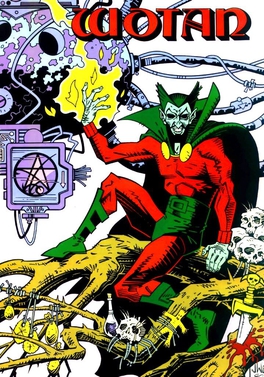Odinism is a term for Heathenry, a modern pagan religion, typically used by those who hold to "folkish" or race-centric ideologies.

The Wild Hunt is a folklore motif occurring across various northern, western and eastern European societies, appearing in the religions of the Germans, Celts, and Slavs. Wild Hunts typically involve a chase led by a mythological figure escorted by a ghostly or supernatural group of hunters engaged in pursuit. The leader of the hunt is often a named figure associated with Odin in Germanic legends, but may variously be a historical or legendary figure like Theodoric the Great, the Danish king Valdemar Atterdag, the dragon slayer Sigurd, the psychopomp of Welsh mythology Gwyn ap Nudd, biblical figures such as Herod, Cain, Gabriel, or the Devil, or an unidentified lost soul. The hunters are generally the souls of the dead or ghostly dogs, sometimes fairies, valkyries, or elves.
The Battle of the Beams was a period early in the Second World War when bombers of the German Air Force (Luftwaffe) used a number of increasingly accurate systems of radio navigation for night bombing in the United Kingdom. British scientific intelligence at the Air Ministry fought back with a variety of their own increasingly effective means, involving jamming and deception signals. The period ended when the Wehrmacht moved their forces to the East in May 1941, in preparation for the attack on the Soviet Union.
Thor is a Germanic god associated with thunder.

The Sturmpanzerwagen A7V was a heavy tank introduced by Germany in 1918 during World War I. One hundred chassis were ordered in early 1917, ten to be finished as fighting vehicles with armoured bodies, and the remainder as Überlandwagen cargo carriers. The number to be armoured was later increased to 20. They were used in action from March to October 1918, and were the only tanks produced by Germany in World War I to be used in combat, as well as being the first operational German Tank. It was developed as a response to British tanks. While certain publications have attempted to claim the A7V was an improvement over its British competition, there is nothing to support this suggestion. It was less capable across rough terrain, slower, required a far larger crew to operate and ultimately never had any success comparable to that of the British ‘Land Ships’.
Odin is the chief god of the Norse pantheon.
Gee-H, sometimes written G-H or GEE-H, was a radio navigation system developed by Britain during the Second World War to aid RAF Bomber Command. The name refers to the system's use of the earlier Gee equipment, as well as its use of the "H principle" or "twin-range principle" of location determination. Its official name was AMES Type 100.
Precision bombing is the attempted aerial bombing of a target with some degree of accuracy, with the aim of maximising target damage or limiting collateral damage. Its strategic counterpart is carpet bombing. An example would be destroying a single building in a built up area causing minimal damage to the surroundings. Precision bombing was initially tried by both the Allied and Central Powers during World War I, however it was found to be ineffective because the technology did not allow for sufficient accuracy. Therefore, the air forces turned to area bombardment, which killed civilians. Since the War, the development and adoption of guided munitions has greatly increased the accuracy of aerial bombing. Because the accuracy achieved in bombing is dependent on the available technology, the "precision" of precision bombing is relative to the time period.
Wotansvolk promulgates a white nationalist variant of Neo-Paganism—founded in the early 1990s by Ron McVan, Katja Lane and David Lane (1938–2007) while Lane was serving a 190-year prison sentence for his actions in connection with the white supremacist revolutionary domestic terrorist organization The Order. After the founding of 14 Word Press by David Lane and his wife Katja to disseminate her husband's writings, Ron McVan joined the press in 1995 and founded Temple of Wotan. 14 Word Press - Wotansvolk proceeded to publish several books for the practice of Wotanism before becoming defunct in the early 2000s.

Karl-Gerät (040/041), also known as Mörser Karl, was a World War II German self-propelled siege mortar (Mörser) designed and built by Rheinmetall. Its heaviest munition was a 60 cm (24 in) diameter, 2,170 kg (4,780 lb) shell; the range for its lightest shell of 1,250 kg (2,760 lb) was just over 10 km (6.2 mi). Each gun had to be accompanied by a crane, a two-piece heavy transport set of railcars, and several modified tanks to carry shells.
Woden, or Odin, is the chief god of Germanic mythology.
Johannes "Hans" Plendl, German radar pioneer, was the scientist whose airplane navigation inventions made possible the early German bombing successes in World War II.
The Lorenz beam was a blind-landing radio navigation system developed by C. Lorenz AG in Berlin for bad weather landing. The first experimental system had been installed in 1932 at Berlin-Tempelhof Central Airport and was demonstrated at the International Air Service Conference in January, 1933. Further improvements of the system were accepted during the meetings in November. 1933 and September 1934. By 1937 in addition to German airports the Lorenz System was employed in Europe, e.g. London, Paris, Milan, Stockholm, Warsaw, Vienna and Zürich, as well as internationally in Japan and Russia, with additional systems in preparation in Australia, South America and South Africa. The Lorenz company referred to it simply as the Ultrakurzwellen-Landefunkfeuer, German for "ultra-short-wave landing radio beacon", or LFF. In the UK it was known as Standard Beam Approach (SBA).

Wotan is a fictional supervillain featured in American comic books published by DC Comics. The character, created by Gardner Fox and Howard Sherman, made their first appearance in More Fun Comics #55 in 1940. Wotan is frequently portrayed as the primary antagonist of Doctor Fate. Originally a female who obtained her powers through sorcery, Wotan later underwent reincarnation in a male form. Adopting the name "Wotan" from Germanic and Norse legends, the character developed a strong desire for power, leading to conflicts with Doctor Fate.
A firebug is an arsonist or pyromaniac.

Ultimate Comics: Thor is a comic book limited series published by Marvel Comics that debuted in October 2010. The series takes place in the alternative Ultimate Marvel universe. Based on the Ultimate Comics version of the Norse god Thor, the series was written by Jonathan Hickman with art by Carlos Pacheco. In an interview, Hickman said that the series would be a prequel to Mark Millar's limited series The Ultimates,
"It starts eons ago, in the long ago time of mystic Asgard, and, yes, takes us up to the start of [the first issue of] ULTIMATES. If I do my job well, it should jive [sic] with all the Ultimate Thor things we've seen up to this point."




